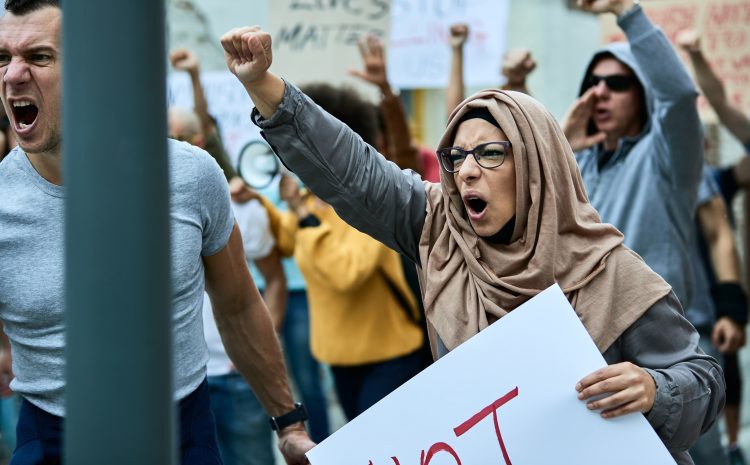HISTORY OF ISLAMOPHOBIA, CAUSES, EFFECTS, AND THE PATH FORWARD
- Introduction: In recent years, the Western world has witnessed a concerning surge in Islamophobia. Islamophobia in the West is not a recent development but has deep historical roots. The Crusades, which occurred during the Middle Ages, were marked by conflicts between Christian Europe and the Muslim Middle East. These historical tensions have left a lasting impact on perceptions of Islam in the West. However, the contemporary rise in Islamophobia can be traced back to more recent events. This prejudice and discrimination against Muslims have permeated various aspects of society, raising serious questions about the values of tolerance, inclusivity, and diversity that many Western nations hold dear. This article will delve into the history, causes, effects, and explore potential solutions for a more harmonious.
- Definition of Islamophobia: Islamophobia is a term that refers to unreasonable dislike or fear of, and prejudice against, Muslims or Islam. It is a form of religious and racial animosity that can result in discrimination, marginalization, and oppression of Muslims or people who are perceived as Muslims.
- Importance of studying Islamophobia: Studying the rise of Islamophobic events is essential for raising awareness, protecting human rights, countering stereotypes, building resilient communities, developing effective policies and interventions, promoting social cohesion, and fostering global understanding. By examining and addressing Islamophobia, we can work towards a more inclusive and tolerant society that respects the rights and dignity of all individuals, regardless of their religious background.
Islamophobia in Historical Context
The colonial legacy and Orientalism created a framework of cultural superiority and stereotypes, perpetuating Islamophobia by portraying Muslims as “other” and reinforcing negative perceptions. The events of 9/11 intensified Islamophobic sentiments, associating Islam with terrorism and fostering fear and suspicion. The subsequent securitization measures and media focus on Muslim perpetrators further contributed to the rise of Islamophobia, amplifying stereotypes and reinforcing a perception of Muslims as a threat. The combination of colonial legacy, Orientalism, and 9/11 has played a significant role in shaping negative attitudes and discrimination against Muslims, fueling the rise of Islamophobia in Western societies.
Major Incidents Islamophobic Incidents
There have been several notable Islamophobic events in the West. While this list is not exhaustive, it has a significant effect in creating anti-Muslim rhetoric:
- September 11, 2001, Attacks: The 9/11 attacks on the World Trade Center in the United States had a profound impact on global perceptions of Islam and Muslims. It led to a surge in Islamophobic sentiments and a perception that Islam is inherently linked to terrorism.
- The Charlie Hebdo Attack (2015): The attack on the French satirical magazine Charlie Hebdo by individuals claiming to act in the name of Islam sparked widespread Islamophobic backlash. It fueled the narrative that Muslims are hostile to freedom of expression and contributed to an increase in anti-Muslim incidents.
- Christchurch Mosque Shootings (2019): In New Zealand, a white supremacist carried out a horrific attack on two mosques, resulting in the loss of 51 innocent lives. This act of terrorism highlighted the global reach of Islamophobia and the real and devastating consequences it can have.
- The “Muslim Ban” (2017): The executive orders issued by former U.S. President Donald Trump, commonly known as the “Muslim Ban,” imposed restrictions on travelers from several predominantly Muslim-majority countries. This policy was widely criticized as discriminatory and contributed to anti-Muslim sentiment.
- Anti-Sharia Protests: Anti-Sharia protests, organized by far-right groups, have taken place in different Western countries. These demonstrations often perpetuate stereotypes and misconceptions about Islamic law and contribute to a hostile environment for Muslims.
- Political Rhetoric and Policy Measures: Islamophobic rhetoric from political leaders and the implementation of policies targeting Muslims have fueled discrimination and stigmatization. Examples include the banning of religious symbols, such as the hijab, and the proposal of laws targeting specific Muslim practices, such as the burqa or halal slaughter.
- Recent Quran Burning in Sweden: The Quran burning incident in Sweden refers to a series of events that took place in June and July 2023, when two men burned a copy of the Quran outside Stockholm’s central mosque during the Muslim holiday of Eid al-Adha. The men had obtained permission from a Swedish court to hold a protest, despite the objections of the police and the Muslim community. The incident sparked outrage and condemnation from various groups, including the Turkish and Moroccan governments, who accused Sweden of failing to protect the rights and dignity of Muslims. The incident also raised questions about Sweden’s NATO membership bid, which has faced opposition from Turkey over its perceived lack of respect for Muslim societies. The Quran burning incident in Sweden was not an isolated event, but part of a larger trend of Islamophobic actions and rhetoric by some far-right groups and individuals in the country. In recent years, Sweden has witnessed several cases of Quran burning or desecration by anti-immigration and anti-Islam activists, such as Rasmus Paludan, a Danish-Swedish politician who has made a name for himself with such stunts. These acts have often provoked violent clashes and riots between supporters and opponents of the Quran burners, as well as attacks on mosques and Muslim properties. The Quran burning incident in Sweden and its effects on the West highlight the need for more dialogue, education, and tolerance between different religious and cultural groups, as well as more legal protection and public awareness against hate crimes and discrimination.
Causes of Islamophobia
- Media Influence: Media plays a substantial role in shaping public opinion. Biased and sensationalized portrayals of Muslims in the media contribute to the perpetuation of stereotypes and misconceptions, reinforcing fear and prejudice. Media representation and sensationalism play a significant role in the rise of Islamophobia in the West. The media has the power to shape public perceptions and attitudes toward Islam and Muslims. Negative portrayals and stereotypes often dominate media coverage, reinforcing biases and fostering a climate of fear and suspicion. Sensationalized reporting of isolated incidents involving Muslims can lead to a distorted perception that portrays the entire Muslim population as a threat, exacerbating Islamophobic sentiments.
- Political Rhetoric: Some politicians have exploited Islamophobia for electoral gains, using anti-Muslim rhetoric to appeal to certain voter demographics especially in countries like India. This type of rhetoric legitimizes discrimination and hostility toward Muslims. Populist rhetoric and political opportunism also contribute to the rise of Islamophobia. Some politicians capitalize on public fears and insecurities, using Islamophobic narratives to gain support or divert attention from other pressing issues. They employ divisive rhetoric that demonizes Muslims, contributing to the normalization of Islamophobia and creating a hostile environment for Muslim communities.
- Lack of Understanding: A significant factor contributing to Islamophobia is the lack of knowledge and understanding about Islam. Misinformation and ignorance can lead to fear, distrust, and the perpetuation of stereotypes. Lack of knowledge and misinformation also play a role in the rise of Islamophobia. Many people have a limited understanding of Islam and rely on misconceptions and stereotypes perpetuated by the media and popular discourse. This lack of knowledge leaves room for misinformation and contributes to the perpetuation of Islamophobic attitudes and beliefs.
- Economic and Social Factors: Economic disparities and social exclusion can exacerbate Islamophobia. Marginalized communities are often more susceptible to prejudice as they lack the resources to challenge stereotypes effectively.
- Use of Social Media. The emergence of social media and online platforms has amplified the spread of Islamophobia. Online spaces provide a breeding ground for hate speech, conspiracy theories, and the dissemination of false information targeting Muslims. These platforms facilitate the rapid spread of Islamophobic narratives, often leading to real-world consequences such as hate crimes and discrimination.
Effects of Islamophobia in The West
- Social Division: Islamophobia fosters divisions within society, pitting different communities against each other. This division weakens social cohesion and can lead to heightened tensions.
- Discrimination and Violence: Hate crimes against Muslims have increased in Western countries. Discrimination in employment, housing, and public spaces is pervasive, making it challenging for Muslims to lead normal lives without fear.
- Alienation: Constant discrimination and hostility lead to feelings of alienation among Muslim communities. In some cases, this alienation can contribute to radicalization, perpetuating stereotypes, and violence.
- Erosion of Democratic Values: The rise in Islamophobia threatens the core values of democracy and pluralism. Discrimination against one religious group undermines the principles of equality and freedom for all.
Consequences of Islamophobia
- Psychological and Emotional Impact on Muslims: it has severe psychological and emotional consequences for Muslims living as a minority in many countries. Constant exposure to negative stereotypes, discrimination, and harassment can lead to feelings of fear, anxiety, and stress. It can also contribute to a sense of alienation, low self-esteem, and a loss of identity. Muslims may experience a heightened sense of vulnerability and may face internal conflicts as they try to reconcile their religious identity with societal attitudes.
- Erosion of Social Cohesion and Multiculturalism: Islamophobia is eroding social cohesion and undermines multiculturalism within a society. Prejudice and discrimination against Muslims are leading to a breakdown of trust and increased social divisions. This can result in the marginalization and exclusion of Muslim communities, hindering their full participation in society. It creates a climate of fear and hostility, which hampers interfaith dialogue, community integration, and cooperation among diverse groups.
- Implications for human rights and civil liberties: Islamophobia poses significant challenges to human rights and civil liberties. Discrimination and hate crimes targeting Muslims can infringe upon their right to freedom of religion, expression, and equal treatment under the law. Policies and practices rooted in Islamophobia, such as racial profiling or surveillance programs disproportionately targeting Muslims, can violate privacy rights and undermine civil liberties. These practices often lead to a chilling effect on freedom of speech and the ability of Muslims to exercise their rights fully.
The Path Forward
The United Nations has also declared 21 March as the International Day to Combat Islamophobia, to raise awareness about this issue and to mobilize action against it. Combating Islamophobia requires a collective effort from various stakeholders, including governments, civil society organizations, educational institutions, and individuals. Here are some strategies and actions that can help combat Islamophobia:
- Education and Awareness: To combat ignorance and foster understanding, there is a need to promote education about Islam and its diverse practices. Schools, universities, and media outlets should play a role in dispelling stereotypes.
- Political Accountability: Holding politicians accountable for their rhetoric is crucial. Citizens should support leaders who promote inclusivity and tolerance rather than those who exploit fear for political gain.
- Interfaith Dialogue: Encouraging dialogue and collaboration between religious communities can build bridges and foster tolerance. Interfaith initiatives can help dispel myths and reduce prejudice.
- Legal Protections: Governments should enact and enforce laws that protect individuals from discrimination based on religion or ethnicity. Strong legal frameworks can deter hate crimes and promote accountability.
- Interfaith and Intercultural Dialogue: Encourage dialogue and interaction between individuals from different religious and cultural backgrounds. Foster relationships and understanding through interfaith events, community gatherings, and cultural exchange programs. Encourage discussions on common values, shared experiences, and debunking misconceptions.
- Responsible Media Representation: Media has the most important role in creating an environment of harmony. Encourage media organizations to portray Muslims and Islam accurately and positively. Promote diverse voices and narratives that challenge stereotypes and showcase the contributions of Muslims to society. Encourage balanced and fair reporting on issues related to Islam and Muslim communities.
- Policy and Legislation: Governments should enact and enforce laws that protect against religious discrimination and hate crimes. Develop policies that promote inclusion, equal opportunity, and the protection of civil liberties. Ensure that law enforcement agencies are trained to address and prevent Islamophobic incidents effectively.
- Community Engagement: Build strong and inclusive communities by promoting dialogue, understanding, and cooperation. Encourage the establishment of community centers, social programs, and initiatives that bring people from diverse backgrounds together. Encourage individuals to actively engage with their local Muslim communities, fostering relationships and solidarity.
- Allies and Advocacy: Encourage individuals, organizations, and influential figures to become allies in the fight against Islamophobia. Speak out against Islamophobic rhetoric and actions, both online and offline. Support advocacy groups that work towards combating Islamophobia and defending the rights of Muslims.
- Empowerment and Support: Provide support and resources for victims of Islamophobia. Establish helplines, counseling services, and legal aid for individuals who experience discrimination or hate crimes. Empower Muslim communities to speak out, share their experiences, and take leadership roles in combating Islamophobia.
Conclusion: It is essential to address the rising Islamophobic events in the West to ensure the protection of human rights, social cohesion, and mutual respect among diverse communities. By understanding the complex interplay of factors that contribute to Islamophobia, society can take proactive measures to challenge stereotypes, promote dialogue, and foster a climate of understanding and acceptance. Muslims are almost half of the world’s population. Discrimination against Muslims can have global effects. It is the need of the hour to have a homogeneous society with religious tolerance towards all religions.
- Introduction: In recent years, the Western world has witnessed a concerning surge in Islamophobia. Islamophobia in the West is not a recent development but has deep historical roots. The Crusades, which occurred during the Middle Ages, were marked by conflicts between Christian Europe and the Muslim Middle East. These historical tensions have left a lasting impact on perceptions of Islam in the West. However, the contemporary rise in Islamophobia can be traced back to more recent events. This prejudice and discrimination against Muslims have permeated various aspects of society, raising serious questions about the values of tolerance, inclusivity, and diversity that many Western nations hold dear. This article will delve into the history, causes, effects, and explore potential solutions for a more harmonious.





